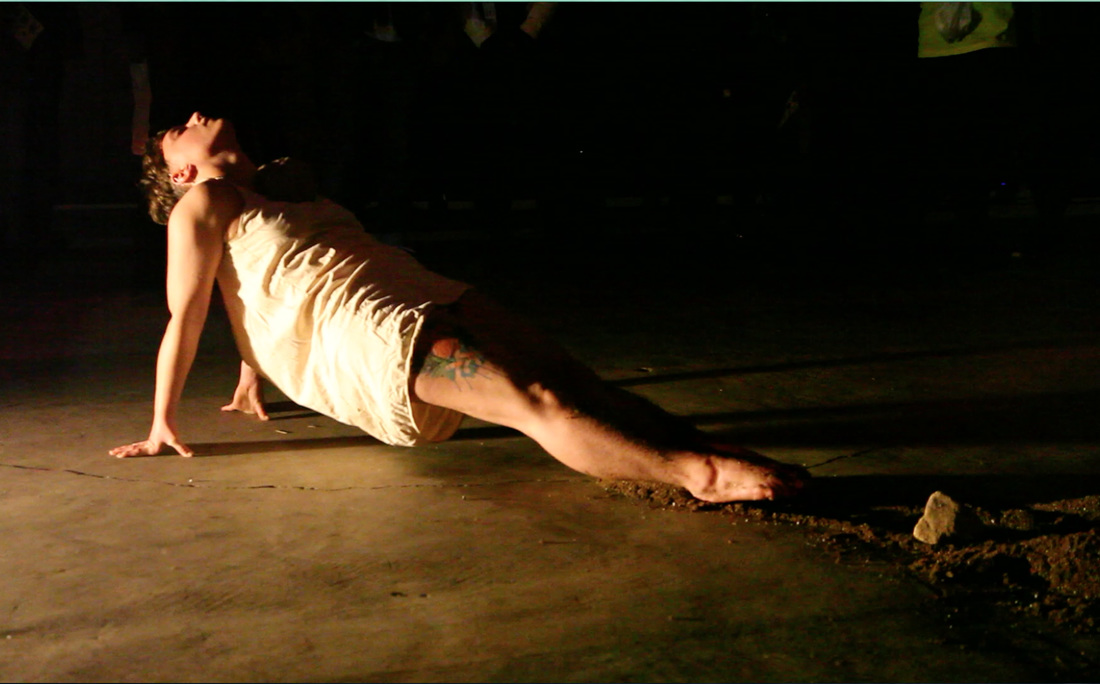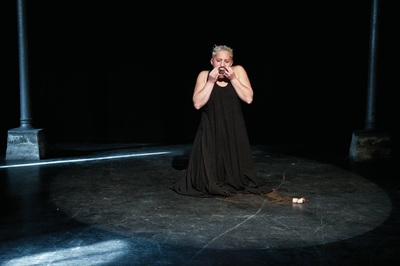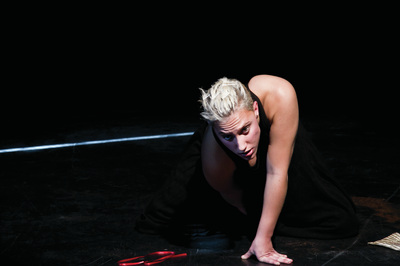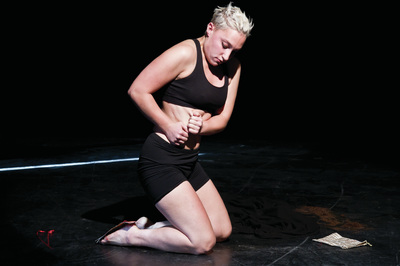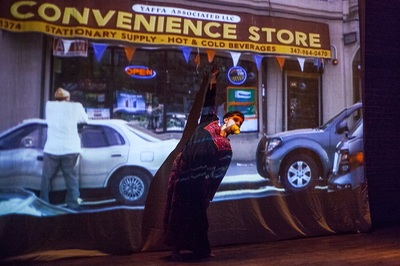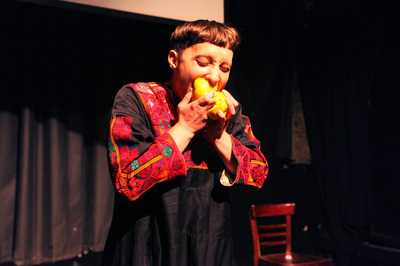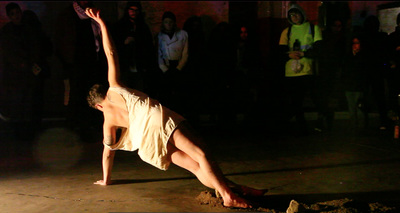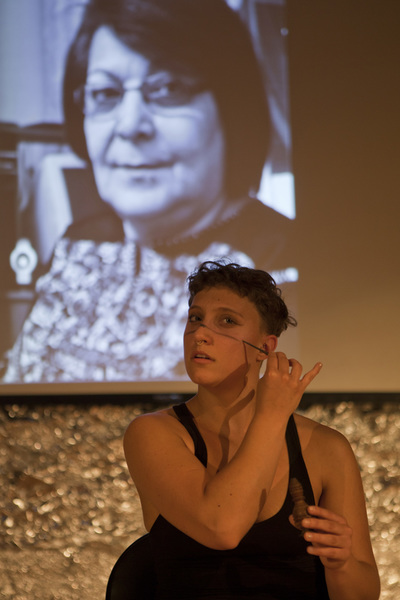|
I had the great pleasure of meeting and working with our next featured artist, Mette Loulou von Kohl, through the performance series The Sphinx Returns at Grace Exhibition Space. von Kohl presented an emotionally charged performance fusing her personal and political relationship with the historic figure Leila Khaled. Within the feature below, von Kohl reveals elements of her performance practice, thoughts on "gender politics" and the integration of choreography and performance art. - Quinn Dukes QUINN DUKES: When did you begin performing? What led you to performance as a medium? METTE LOULOU von KOHL: I began performing as an actor in a traditional theater sense when I was very young. I grew up surrounded by art of all mediums, but experienced particularly a lot of theater and developed a passion for this form a young age. I trained and performed in theater through high school and college. But studying acting in college destroyed me, and I graduated with very little confidence in myself as a performer and so decided that I was done with performing all together. In the year following graduation, I became extremely depressed for a combination of reasons and started to go to therapy. It was in therapy that I began to write creatively, trying to deal with my emotions by putting them down on paper. In this process I began asking myself what is my passion? What can I not be without? And the answer that came out through my writing was Palestine. Being a Palestinian, asking myself what does that mean to me, and where do I fit into this larger narrative of struggle and resistance? I had been sitting with this history for so long, locked up deep inside me, letting it out only in heated debates with Zionists and then being made to feel ashamed of my anger. Through writing, this anger took on a new form, with more precision and control. Still full of rage, but this time using it as a tool with a clear target. I continued to write and was then offered the opportunity to perform at a festival in Copenhagen where I was living at the time, and I took it. I hadn’t performed in two years, and had never made a solo piece, let alone an original piece of work, but thought why not? No one really knows me here so let me try, take the risk in the safety of anonymity, and see what happens. As a starting place, I turned to the writing I had been doing and had the task of telling these stories with just myself. So I made my first piece, titled Grieving for the Undesirable, which wove movement, audio recordings of my voice, music and performative actions. After that I began making other solo works based on writings on Palestine and my relationship to this identity and history. This continues to be my focus as I develop my body of work, however the mediums I employ are evolving, as I now also incorporate video projection, remixed audio and archival footage. QD: Do you feel that the conversation surrounding gender politics has evolved over the past few years? Has this influenced your work? MLvK: My first reaction to this question is to ask, conversations where and with whom? Gender politics is a term, that honestly sounds too academic and a concept I have difficulty locating in my every day life. I believe there is now a hype around trans identities as “hip” and “in” by mainstream culture. This gives the false impression that the conversation around gender has evolved. However this “evolution” has not stopped 21 transwomen, mostly of color, from being killed in 2015. The evolution around gender politics is not worth anything if lives are still being lost. How this influences my work is that I am intentional in presenting my work in dialogue with other artists of color and queer artists of color as a method of organizing, strategizing and cross struggle movement building. QD: It seems like several of your works incorporate elements of dance choreography and performative actions. How does this integrated method help portray your personal narrative? MLvK: The use of my body in performance is a choice I make when words are no longer enough. I don’t necessarily identify dance in my work- more so movement. I turn to performative action when movement feels too abstract. I usually employ performative actions in relation to an object that I am using. I work a lot with objects that carry personal symbolism and/or Palestinian national symbolism, such as the Jaffa orange, olives/olive trees, keys, stones, earth, the keffiyeh, and the thobe. I employ performative actions with these objects when I want to communicate direct commentary on a subject or symbol embodied in the specific object. Performative actions are a direct and calculated conversation I am setting up with the audience, while movement functions more as a mode emotional release and a bearing to the audience of an inner dialogue with myself. The intersection and layering of the two elements is then what I challenge the audience to think about and what I challenge myself to feel. QD: I see that you have travelled quite a bit, are you inspired by location? MLvK: I am not inspired by location. I am inspired by the act of traveling and relocation, relocating my body from one place to the next. As a Palestinian in the diaspora, whose grandparents lived through the Nakba and displacement from their land, I identify the act of relocation as a continuation of this history and a continuation of their struggle to move again and again, unable to return home and searching for a sense of belonging. I identify this sense of belonging in the act of moving itself. It not where I have traveled to which is the source of inspiration but rather how I got there. QD: Are there any actionists and/or performance artists who inspire your practice? MLvK: Palestinians living under occupation, Palestinians living in refugee camps, Palestinians living in the diaspora, are my inspiration and it is for them that I do this work. aboutMette Loulou von Kohl was born from the orange at the center before the new world came. She is a performer and a wanderer. Currently based in New York City, Mette Loulou is a mixed-race queer femme, born to a Lebanese/Palestinian mother and Danish father. She has lived in New York, Romania, Morocco and Denmark. Mette Loulou is fascinated by the intersection between her personal identities as a jumping off point to reveal, dismantle and rebuild realities and dreams. She grapples with her past to complicate and better understand her present. Mette Loulou weaves movement, words, and her love for the unexpected into the exploration of her embodied histories. She exists in two places at once.
0 Comments
Your comment will be posted after it is approved.
Leave a Reply. |
CONTRIBUTORSIan Deleón Archives
July 2023
|
|
MISSION // Based in Brooklyn, NYC, PERFORMANCE IS ALIVE is an online platform featuring the work and words of current performance art practitioners. Through interviews, reviews, artists features, sponsorship and curatorial projects, we aim to support the performance community while offering an access point to the performance curious.
Performance Is Alive is a fiscally sponsored project of Fractured Atlas, a 501(c)(3) charity. Contributions made payable to Fractured Atlas for the purposes of Performance Is Alive are tax-deductible to the extent permitted by law. |
